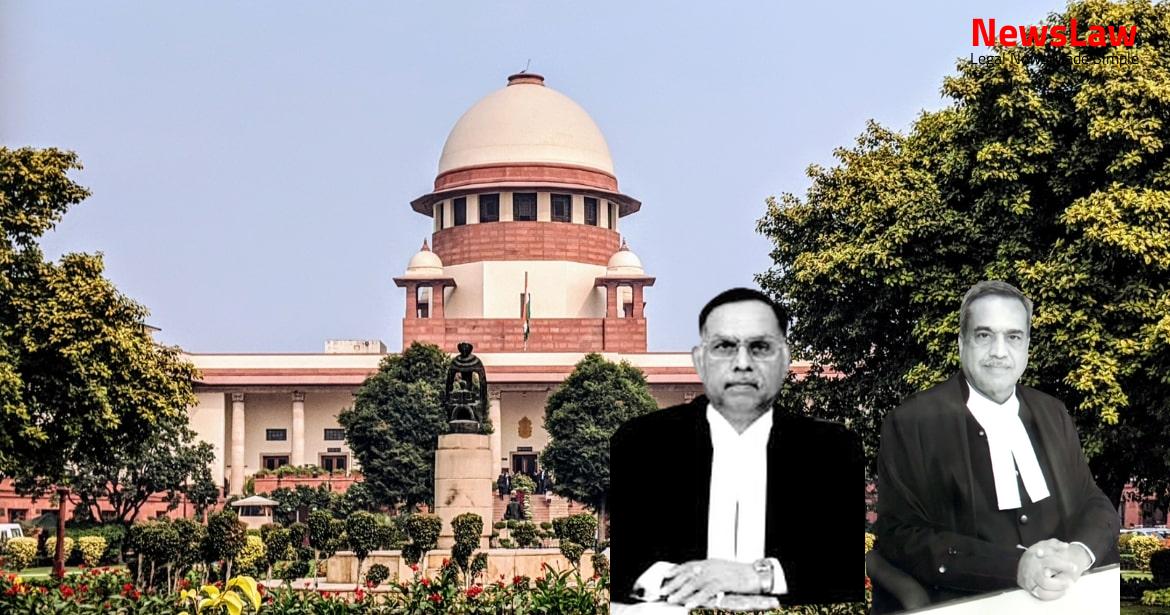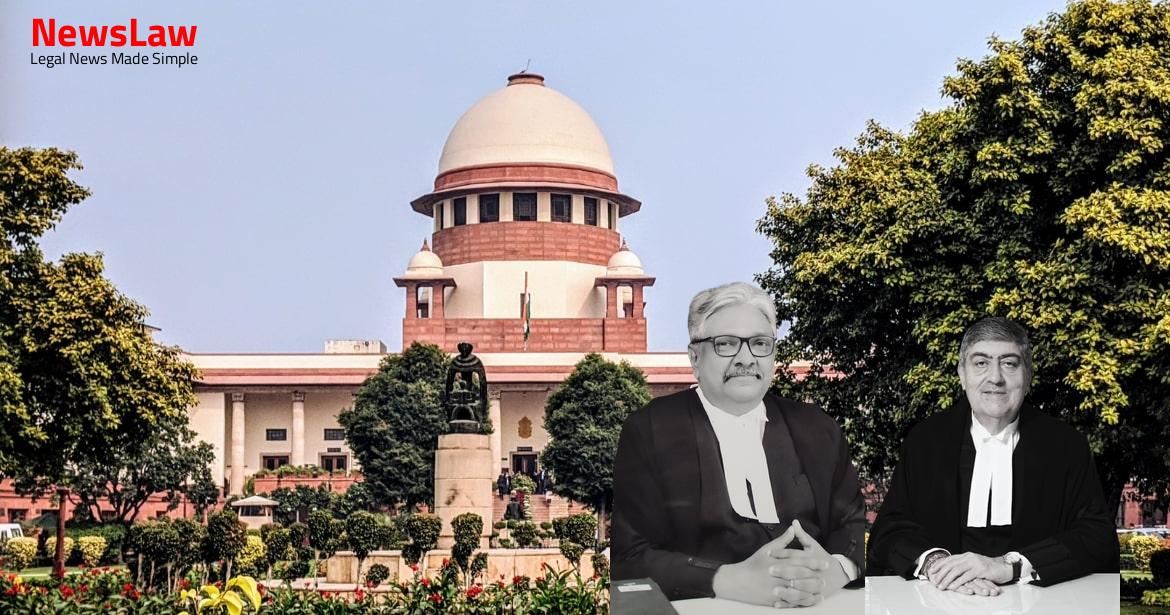Explore the nuanced legal analysis in a recent appeal regarding a homicide conviction. The court’s thorough examination of the facts, evidence, and applicable legal principles highlights the importance of meticulous evaluation in criminal cases. Understanding the complexities of the legal framework is crucial in determining the appropriate convictions in such cases.
Facts
- The court considered the arguments presented by both the parties.
- The court analyzed the facts and evidence provided in detail.
- The court evaluated the legal principles applicable to the case.
- The court reached a decision based on the findings and legal framework.
- The appellant is aggrieved by the judgment dated 18.01.2017 of the Madurai Bench of the High Court, which confirmed the conviction under Section 302 IPC.
- The appeal is limited to the question of whether the conviction should have been under Section 304 Part II or Section 302 IPC.
- The issue to be considered is whether the appellant should be convicted under Section 302 IPC or any lesser offense like Section 304 Part II IPC.
Also Read: Transfer of Writ Petitions for Chartered Accountants’ Tax Audit Guidelines
Issue
- Whether the case falls under Section 304 Part II IPC
Also Read: Analyzing Interference with Acquittal in Legal Conviction Case
Arguments
- The appellant argues that the offence should fall under Exception I to Section 300 IPC due to sudden and grave provocation, warranting conviction for a lesser offence than Section 302 IPC.
- State counsel contends that based on evidence, both Trial Court and High Court correctly convicted the accused under Section 302 IPC.
- The appellant emphasizes that due to a single blow and the presence of a knife, Section 302 IPC should not be applied.
- The lack of established motive, with the alleged motive being four months prior to the incident, is highlighted by the appellant.
- Citing precedent cases, the appellant argues that a single stab injury should not attract Section 302 IPC.
- Prosecution argument that motive is insignificant when eyewitnesses are available.
- Court precedent emphasizing that the number of injuries is not the sole factor in determining intention.
- Focus on nature of injury, body part affected, and weapon used to ascertain intent of accused.
- Citing various court decisions where single injury cases led to Section 302 IPC being invoked.
- Eye-witnesses PWs 1, 2, and 3 present in the current case, rendering motive insignificant.
- No absolute legal proposition from court decisions exempting Section 302 IPC in single blow cases.
Also Read: Judicial Review on Sentence and Compensation in Criminal Case
Analysis
- No hard and fast rule that in a case of single injury Section 302 IPC would not apply
- Court sets aside acquittal under Section 302 IPC and convicts accused based on nature of injury, body part targeted, and other circumstances
- Exception 4 of Section 300 IPC covers acts done in a sudden fight
- Motive is always in the mind of the person committing the act
- Usual motives like revenge, greed, jealousy may be absent in certain cases
- Various cases discussed where single injury led to convictions under Section 302 IPC
- Intention is a matter of fact and is derived from the circumstances, weapon used, and injury caused
- The absence of motive does not disperse a prosecution case if evidence proves the act
- Motive is not a necessary element under the Penal Code, but can aid the prosecution in cases of circumstantial evidence.
- Exception 4 deals with situations where both parties are equally at fault despite a provocation.
- Intent plays a crucial role in determining whether an act falls under Section 302 or lesser offences like Section 304.
- A ‘sudden fight’ implies mutual provocation and blows on both sides.
- Heat of passion must be immediate without time for passions to cool down.
- The nature of injury, weapon used, and circumstances are vital in determining the offender’s intention.
- Individual facts and circumstances dictate whether a quarrel is sudden or not.
- The absence of a proven motive does not weaken the prosecution’s case if other evidence confirms the incident.
- The nature of injury, weapon used, and body part targeted indicate the offender’s intent.
- Single injury cases can still attract Section 302 depending on various factors.
- Provocation in Exception 4 does not directly cause the resulting injury, making it complex to attribute blame.
- Exception 4 criteria must all be met to apply it in a case.
- A single blow does not automatically exclude Section 302 IPC applicability.
- Intention to cause death can be gathered from various circumstances
- Exception IV to Section 300 IPC provides conditions for culpable homicide not amounting to murder
- Undue advantage and cruel or unusual manner must be absent in case of sudden fight in the heat of passion
- Undue advantage means unfair advantage
- The case falls under Section 304 Part I of the IPC.
- The accused inflicted the blow with a weapon like a knife.
- The injury was inflicted on a vital part of the body.
- Causing such bodily injury was likely to cause death.
Decision
- The appeal is allowed in part.
- The accused’s conviction under Section 302 IPC is modified to Section 304 Part I IPC.
- The accused is sentenced to 8 years rigorous imprisonment with a fine of Rs.10,000/- and in default, to undergo one year R.I.
- The appeal is allowed to the above extent.
Case Title: STALIN Vs. THE STATE THR REP BY THE INSPECTOR OF POLICE (2020 INSC 540)
Case Number: Crl.A. No.-000577-000577 / 2020



